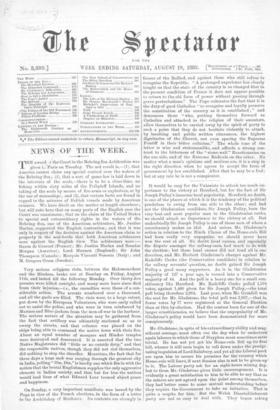It would be easy for the Unionists to attach too
much im- portance to the victory at Hereford, but for the fact of Sir Joseph Pulley's immense local popularity. Hereford, no doubt, is one of the places at which it is the tendency of the political pendulum to swing from one side to the other; and had not the Gladstonian candidate, Sir Joseph Pulley, been the very best and most popular man in the Gladstonian ranks, we should attach no importance to the victory at all. But undoubtedly Sir Joseph Pulley is one of those men of whom a constituency makes an idol. And unless Mr. Gladstone's action in relation to the Ninth Clause of the Home-rule Bill had been really very unpopular, we should never have won the seat at all. No doubt local causes, and especially the dispute amongst the railway-men, had much to do with the election ; but these local causes did not tend all in one direction, and Mr. Herbert Gladstone's charges against Mr. Radcliffe Cooke (the Conservative candidate) in relation to the railway servants' question, no doubt gained Sir Joseph Pulley a good many supporters. As it is, the Gladstonian majority of 127 a year ago, is turned into a Conservative majority of 44. And the poll is a heavy one for a small con- stituency like Hereford. Mr. Radcliffe Cooke polled 1,504 votes, against 1,460 given for Sir Joseph Pulley,—the total poll being therefore 2,964. Last year, when Mr. Grenfell won the seat for Mr. Gladstone, the total poll was 2,887,—that is, fewer votes by 77 were registered at the General Eleotion than at this by-election. Had the contest been for one of the larger constituencies, we believe that the unpopularity of Mr. Gladstone's policy would have been demonstrated far more conspicuously.


































